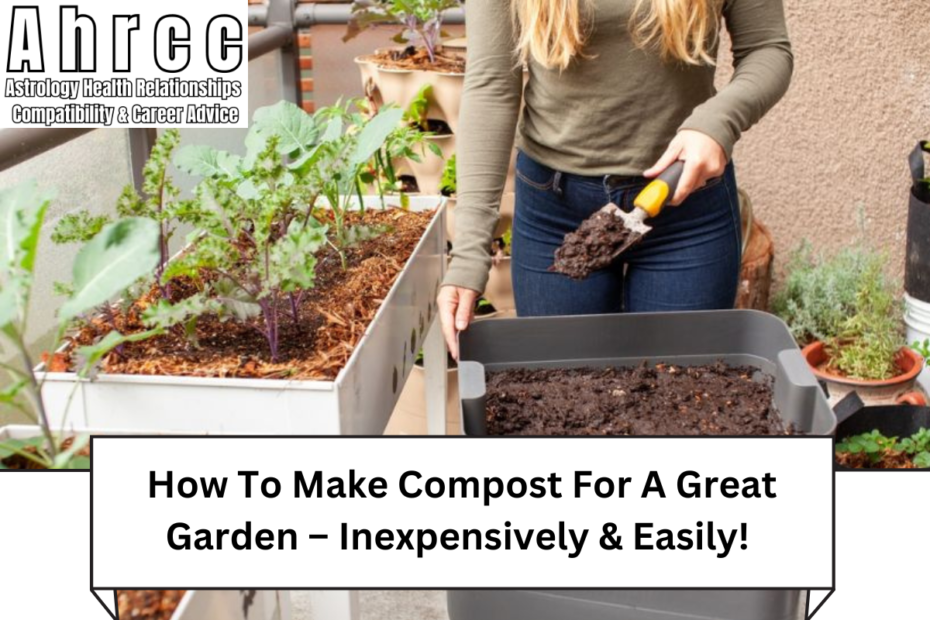How To Make Compost For A Great Garden – Inexpensively & Easily!: Composting is one of the best ways to recycle organic waste into nutrient-rich soil for your garden. It’s not only eco-friendly but also a cost-effective method to enhance the fertility of your soil, resulting in healthier plants and abundant harvests.
The good news is, you don’t need expensive equipment or fancy methods to create high-quality compost. With a little effort, you can make compost easily and inexpensively at home. In this guide, we’ll walk you through the steps to create great compost and share tips on how to keep the process simple and efficient.
The Basics of Composting
Composting is the natural process of breaking down organic materials like food scraps, leaves, and yard waste into rich, dark soil. Microorganisms like bacteria and fungi, along with worms and insects, play a key role in decomposing the organic matter.
For successful composting, you need four essential elements:
- Green materials: These are nitrogen-rich items like kitchen scraps (vegetable peels, fruit scraps), grass clippings, and coffee grounds.
- Brown materials: These carbon-rich items include dried leaves, straw, cardboard, and paper.
- Water: Moisture is needed to aid in the decomposition process.
- Air: Aerating the compost regularly provides oxygen to the microorganisms that break down the materials.
The right balance of green and brown materials is crucial. A good rule of thumb is to aim for about 3 parts brown materials to 1 part green materials.
Step-by-Step Guide to Making Compost
1. Choose a Composting Method
There are various methods of composting, but here are two simple and inexpensive ones:
- Compost Bin: You can use a plastic bin or a wooden structure to contain your compost pile. DIY bins can be easily made using wooden pallets or other materials around the house.
- Compost Pile: If you have space in your backyard, you can create a simple compost heap directly on the ground. No bin is required, and it’s ideal for large gardens.
2. Add Your Green and Brown Materials
Start by adding a layer of brown materials (dried leaves, straw, or shredded cardboard) to your compost pile or bin. This creates airflow from the bottom and prevents your compost from becoming too wet.
Next, add a layer of green materials (vegetable peels, fruit scraps, coffee grounds, or fresh grass clippings). Alternate between brown and green layers as you add more materials over time.
Tip: Avoid adding meat, dairy, or oily foods to your compost pile, as they can attract pests and create bad odors.
3. Keep the Compost Moist
Compost needs to be kept moist but not soggy. A simple way to test moisture is by squeezing a handful of compost. It should feel like a damp sponge – not too dry and not too wet.
During dry spells, you can lightly water your compost pile to maintain moisture levels. However, if your compost is too wet, add more brown materials like dried leaves or newspaper to soak up excess moisture.
4. Turn the Compost Regularly
Aerating your compost is essential to speed up the decomposition process. Use a garden fork or shovel to turn the compost every few weeks to mix in air and promote faster breakdown.
By turning the pile, you’ll help the materials break down evenly, and prevent the compost from becoming compacted or smelly.
How Long Does It Take?
Depending on your climate, composting method, and the materials you’re using, the composting process can take anywhere from a few months to a year. Warmer temperatures and regular turning will speed up the process.
You’ll know your compost is ready when it’s dark, crumbly, and has an earthy smell. The original materials should be unrecognizable, except for larger items like twigs or eggshells, which can take longer to break down.
Using Your Compost
Once your compost is ready, it’s time to put it to use! Here’s how you can use compost in your garden:
- As a soil amendment: Mix compost into garden beds to improve soil structure, water retention, and fertility.
- Mulching: Spread compost around plants to help retain moisture, suppress weeds, and add nutrients.
- Compost tea: Create a nutrient-rich liquid by soaking compost in water for a few days. Use this “tea” to water your plants for an extra boost of nutrients.
Conclusion
Making compost at home is an easy and inexpensive way to recycle your organic waste and create nutrient-rich soil for your garden. By following a few simple steps and regularly maintaining your compost pile, you can create high-quality compost that will help your garden thrive.
Whether you’re composting in a bin or just a simple pile, you’ll be contributing to a more sustainable environment while reaping the benefits of healthier plants and abundant harvests.
